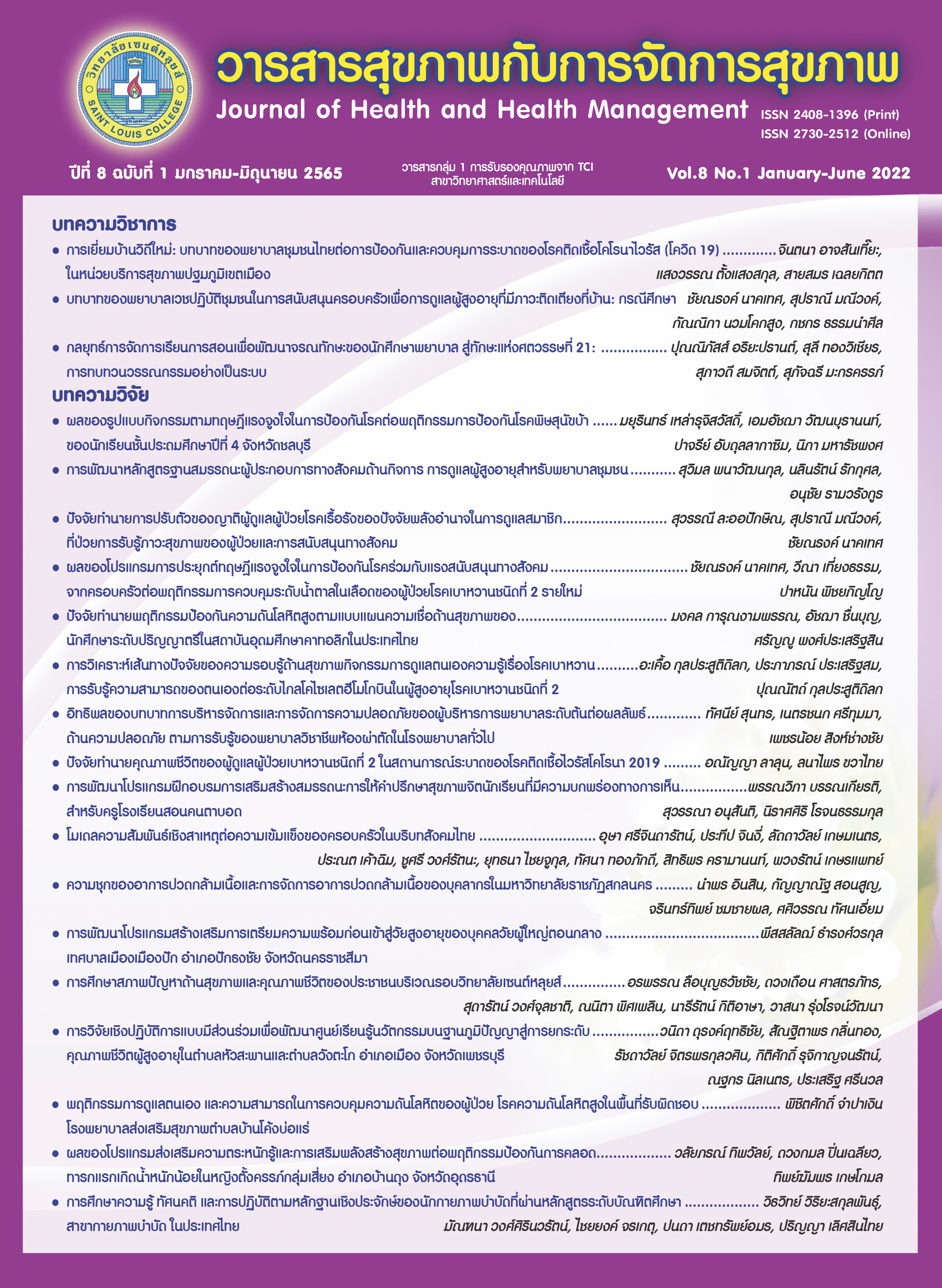The Development of a Competency-Based Curriculum on Social Entrepreneurs in the Elderly Care Business for Community Nurses
Keywords:
Competency, Competency-Based Curriculum, Social Entrepreneur, Elderly Care Business, Community NursesAbstract
This research aimed to study the competence of social entrepreneurs in the elderly care business and to develop a competency-based curriculum for social entrepreneurship in the elderly care business for community nurses. The research was divided into 2 phases: Phase 1 was to study the competence of community nurses, as social entrepreneurs in the elderly care business. The results of this competency study were considered in a group discussion of 23 experts, selected through purposive sampling. Next, the results of the group discussion were analyzed. It was found that the competencies of social entrepreneurship in the elderly care business consisted of 4 competencies, namely: 1) entrepreneurial competency, 2) competence in developing social innovation, 3) social competency, and 4) professional health services competency. The index of item-objective congruence determined that the occupation, key purpose, key role, key function, units of competency, elements of competency, and performance criteria were highly consistent with a score of 1, except for items 35, 52, 74, and 76, which had an assessment result of 0.95. Phase 2 developed a competency-based curriculum on social entrepreneurship in the elderly care business for community nurses by converting these competencies of social entrepreneurship in the elderly care business for community nurses into four modules, namely: Module 1: Social Business Development consisting of fourteen learning outcomes of ninety training hours. Module 2: the Development of Social Innovation and Module 3: Community Engagement consisting of one learning outcome requiring fifteen training hours per module. Module 4: Health Services consisting of eight items of learning outcomes totaling thirty training hours. The total number of training hours was 150. The suitability of the Social Entrepreneurship Competency-Based Curriculum in Elderly Care Business for Community Nurses was assessed by ten experts using the suitability assessment form developed by the researcher. By analyzing percentages, mean, and standard deviation, the assessment results showed that the overall curriculum was appropriate at the highest level ( = 4.78). When considering each item, it was found that all items were most suitable as well.
References
กรมพัฒนาธุรกิจการค้า กระทรวงพาณิชย์. (2561). คู่มือพัฒนาธุรกิจดูแลผู้สูงอายุสู่เกณฑ์มาตรฐานคุณภาพบริหารจัดการธุรกิจ. กรุงเทพ. ม.ป.ท.
จินดาพร บุญประกอบ, 2555. การพัฒนาหลักสูตรรายวิชาเพิ่มเติมด้วยเทคนิคดาคัม หน่วยการเลี้ยงปลาสวยงาม สำหรับนักเรียนชั้นประถมศึกษาปีที่ 6:กรณีศึกษาโรงเรียนวัดมหาราช. (วิทยานิพนธ์ปริญญามหาบัณฑิต). มหาวิทยาลัยเทคโนโลยีราชมงคลธัญบุรี, ปทุมธานี.
ปราโมทย์ ประสาทกุล. (2560). สถานการณ์ผู้สูงอายุไทย2561. นครปฐม. บริษัทพริ้นเทอรี่.
รัชนีนามจันทรา, และวรรณี บุญช่วยเหลือ. (2551).ประเด็นและแนวโน้มทางการบริหารการพยาบาล.นนทบุรี: มหาวิทยาลัยสุโขทัยธรรมาธิราช.
วราภรณ์ ศิลป์สวัสดิ์. (2553). สมรรถนะพยาบาลเวชปฏิบัติทั่วไป.(วิทยานิพนธ์ปริญญามหาบัณฑิต). จุฬาลงกรณมหาวิทยาลัย, กรุงเทพฯ.
วาณีรัตน์ รุ่งเกียรติกุล, และวรรณา งามประเสริฐ.(2560). นวัตกรรมระบบสารสนเทศส่งต่อเพื่อการพยาบาลที่บ้านดุจโรงพยาบาลในกรุงเทพมหานคร. วารสารพยาบาลสาธารณสุข,30(พิเศษ), 207-222.
ศูนย์วิจัยกสิกรไทย. (2561). ตลาดผู้สูงวัย ขุมทรัพย์SME ไทย.สืบค้นจาก https://www.kasikornbank.com/th/business/sme/ksmeknowledge/article/ksmeanalysis/pages/aging-market_sme-treasure_2018.aspx
สภาการพยาบาล. (2561). คลินิกพยาบาลชุมชนอบอุ่น.สืบค้นจาก https://www.tnmc.or.th/news/407
สภาการพยาบาล. (2561). ประกาศสภาการพยาบาล เรื่อง สมรรถนะหลักของผู้สำเร็จการศึกษาระดับปริญญาตรี ปริญญาโท ปริญญาเอกสาขาพยาบาลศาสตร์ หลักสูตรฝึกอบรมพยาบาลขั้นสูงระดับวุฒิบัตรและได้รับวุฒิบัตร/หนังสืออนุมัติแสดงความรู้ความชำนาญเฉพาะทางการพยาบาลและผดุงครรภ์ และการพยาบาลเฉพาะทางสาขาพยาบาลศาสตร์.สืบค้นจาก https://www.tnmc.or.th/images/userfiles/files/004.pdf
สมจิต หนุเจริญกุล. (2550). พยาบาลเวชปฏิบัติกับการพัฒนาบริการปฐมภูมิ.วารสารระบบบริการปฐมภูมิและเวชศาสตร์ครอบครัว.ม.ป.ท.
Amini, Z., Arasti, Z., & Baghen, A. (2018). Identifying social entrepreneurship competencies of managers in social entrepreneurship organizations in healthcare sector. Journal of Global Entrepreneurship Research. 8(19): 1-14. https://doi.org/10.1186/s40497-018-0102-x
Chaisompong, L. (2017). Aged without disease, from https://www.bumrungrad.com/en/health-blog/january-2012/aging-without-disease.
Gilmartin, M. J. 2013. Principles and Practice of Social Entrepreneurship for Nursing.journal of Nursing Education. 62(11): 641-644. https://doi.org/10.3928/01484834-20131014-03
Koo, B., Te, V., J. J. Lee and H. J. Park. 2015. Social Entrepreneuship Education Across the Disciplines: Engineering and Business Students Co-learn, from https://www.oecd.org https://www.o/cfe/leed/BGP_Entrepreneurship-in-Education.pdf
McClelland, D. C. (1975). A Competency Model for human resource development specialists to be used in the delivery of the human resource management cycle. Boston: Mcber.
Murray. R., Mulgan, G., and Caulier-Grice, J. (2008). Generating Social Innovation: Settingan Agenda, Shaping Methods and Growing the Field, from https://youngfoundation.org/wp-content/uploads/2012/10/How-to-innovate-the-tools-for-social-innovation.pdf
Ortiz, I. and M. Cummins. (2011). Global Inequality: Beyond the Bottom Billion. A Rapid Review of Income Distribution in 141 Countries. Social and Economic Policy Working Paper, UNICEF Policy and Practice. https://doi.org/10.2139/ssrn.1805046
Weerawardena, J. and G. Sullivan. 2006. Investigating social entrepreneurship. Journal of World Business. 41: 21-35. https://doi.org/10.1016/j.jwb.2005.09.001
Downloads
Published
How to Cite
Issue
Section
License
Copyright (c) 2022 Journal of health and health management

This work is licensed under a Creative Commons Attribution-NonCommercial-NoDerivatives 4.0 International License.




